
evalverse
The Universe of Evaluation. All about the evaluation for LLMs.
Stars: 159
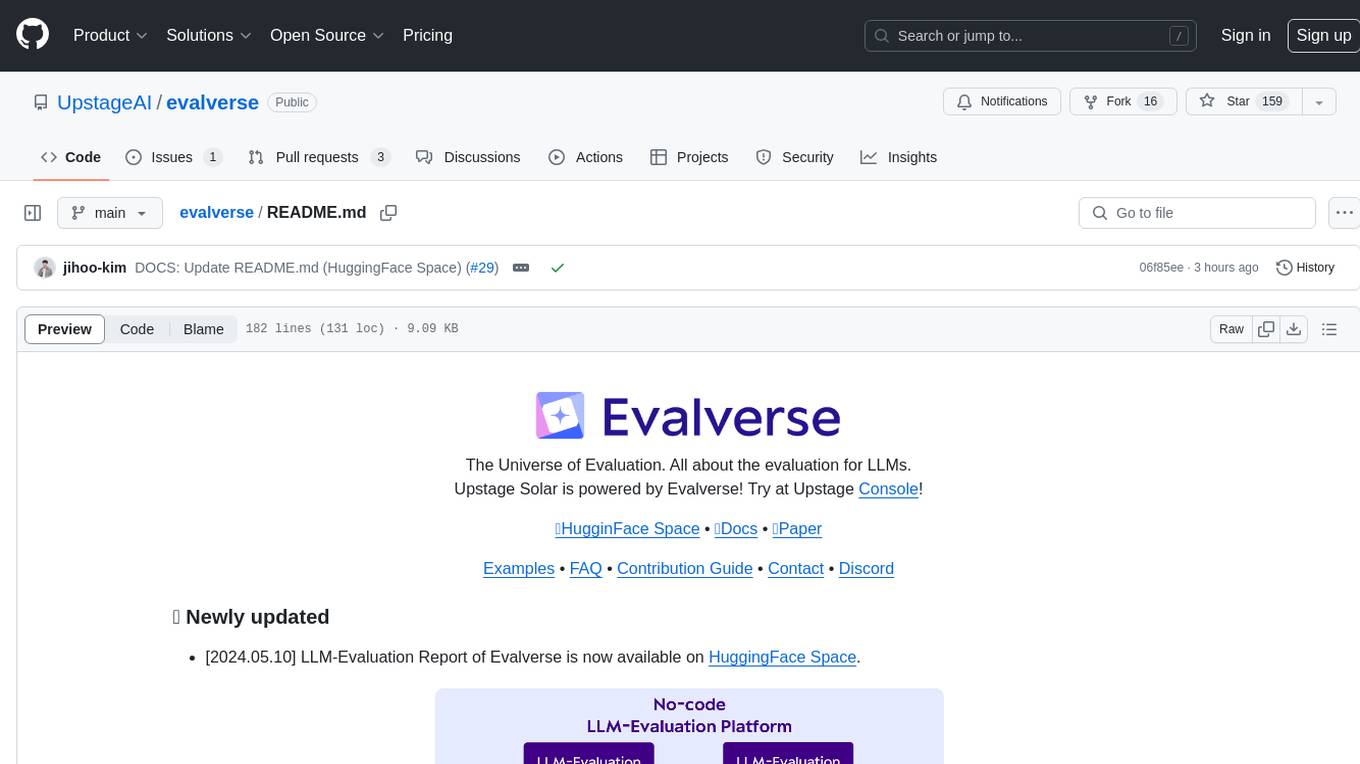
Evalverse is an open-source project designed to support Large Language Model (LLM) evaluation needs. It provides a standardized and user-friendly solution for processing and managing LLM evaluations, catering to AI research engineers and scientists. Evalverse supports various evaluation methods, insightful reports, and no-code evaluation processes. Users can access unified evaluation with submodules, request evaluations without code via Slack bot, and obtain comprehensive reports with scores, rankings, and visuals. The tool allows for easy comparison of scores across different models and swift addition of new evaluation tools.
README:

The Universe of Evaluation. All about the evaluation for LLMs. Upstage Solar is powered by Evalverse! Try at Upstage Console!
🤗HugginFace Space • 📚Docs • 📄Paper
Examples • FAQ • Contribution Guide • Contact • Discord
- [2024.05.10] LLM-Evaluation Report of Evalverse is now available on HuggingFace Space.
Evalverse is a freely accessible, open-source project designed to support your LLM (Large Language Model) evaluation needs. We provide a simple, standardized, and user-friendly solution for the processing and management of LLM evaluations, catering to the needs of AI research engineers and scientists. We also support no-code evaluation processes for people who may have less experience working with LLMs. Moreover, you will receive a well-organized report with figures summarizing the evaluation results.
- access various evaluation methods without juggling multiple libraries.
- receive insightful report about the evaluation results that helps you to compare the varied scores across different models.
- initiate evaluation and generate reports without any code via Slack bot.
- Unified evaluation with Submodules: Evalverse extends its evaluation capabilities through Git submodules, effortlessly incorporating frameworks like lm-evaluation-harness and FastChat. Swiftly add new tools and keep pace with the latest in LLM evaluation.
-
No-code evaluation request: With Evalverse, request LLM evaluations without any code, simply by sending
Request!in a direct message or Slack channel with an activate Evalverse Slack bot. Enter the model name in the Huggingface hub or local model directory path in Slack, and let the bot handle the rest. -
LLM evaluation report: Obtain comprehensive, no-code reports from Evalverse. Request with a simple command -
Report!-, select the model and evaluation criteria, and receive detailed reports with scores, rankings, and visuals, all generated from the stored score database.
If you want to know more about Evalverse, please checkout our docs.
By clicking below image, it'll take you to a short intro video!

Before cloning, please make sure you've registered proper SSH keys linked to your GitHub account.
- Notes: add
--recursiveoption to also clone submodules
git clone --recursive https://github.com/UpstageAI/evalverse.git
cd evalverse
pip install -e .
Currently, installation via Pypi is not supported. Please install Evalverse with option 1.
You have to set an API key and/or Token in the .env file (rename .env_sample to .env) to use all features of Evalverse.
- OpenAI API Key (required for
mt_bench) - Slack BOT/APP Token (required for slack reporter)
OPENAI_API_KEY=sk-...
SLACK_BOT_TOKEN=xoxb-...
SLACK_APP_TOKEN=xapp-...
More detailed tutorials are here.
-
basic_usage.ipynb: Very basic usage, like how to use
Evaluatorfor evaluation andReporterfor generating report. - advanced_usage.ipynb: Introduces methods for evaluating each benchmark and all benchmarks collectively.
The following code is a simple example to evaluate the SOLAR-10.7B-Instruct-v1.0 model on the h6_en (Open LLM Leaderboard) benchmark.
import evalverse as ev
evaluator = ev.Evaluator()
model = "upstage/SOLAR-10.7B-Instruct-v1.0"
benchmark = "h6_en"
evaluator.run(model=model, benchmark=benchmark)Here is a CLI script that produces the same result as the above code:
cd evalverse
python3 evaluator.py \
--h6_en \
--ckpt_path upstage/SOLAR-10.7B-Instruct-v1.0Currently, generating a report is only available through the library. We will work on a Command Line Interface (CLI) version as soon as possible.
import evalverse as ev
db_path = "./db"
output_path = "./results"
reporter = ev.Reporter(db_path=db_path, output_path=output_path)
reporter.update_db(save=True)
model_list = ["SOLAR-10.7B-Instruct-v1.0", "Llama-2-7b-chat-hf"]
benchmark_list = ["h6_en"]
reporter.run(model_list=model_list, benchmark_list=benchmark_list)| Model | Ranking | total_avg | H6-ARC | H6-Hellaswag | H6-MMLU | H6-TruthfulQA | H6-Winogrande | H6-GSM8k |
|---|---|---|---|---|---|---|---|---|
| SOLAR-10.7B-Instruct-v1.0 | 1 | 74.62 | 71.33 | 88.19 | 65.52 | 71.72 | 83.19 | 67.78 |
| Llama-2-7b-chat-hf | 2 | 53.51 | 53.16 | 78.59 | 47.38 | 45.31 | 72.69 | 23.96 |
We currently support four evaluation methods. If you have suggestions for new methods, we welcome your input!
| Evaluation | Original Repository |
|---|---|
| H6 (Open LLM Leaderboard) | EleutherAI/lm-evaluation-harness |
| MT-bench | lm-sys/FastChat |
| IFEval | google-research/instruction_following_eval |
| EQ-Bench | EQ-bench/EQ-Bench |
If you have any use-cases of your own, please feel free to let us know. We would love to hear about them and possibly feature your case.
✨ Upstage is using Evalverse for evaluating Solar.
✨ Upstage is using Evalverse for evaluating models at Open Ko-LLM Leaderboard.
Evalverse is an open-source project orchestrated by the Data-Centric LLM Team at Upstage, designed as an ecosystem for LLM evaluation. Launched in April 2024, this initiative stands at the forefront of advancing evaluation handling in the realm of large language models (LLMs).
Evalverse is completely freely-accessible open-source and licensed under the Apache License 2.0.
If you want to cite our 🌌 Evalverse project, feel free to use the following bibtex. You can check our paper via link.
@misc{kim2024evalverse,
title={Evalverse: Unified and Accessible Library for Large Language Model Evaluation},
author={Jihoo Kim and Wonho Song and Dahyun Kim and Yunsu Kim and Yungi Kim and Chanjun Park},
year={2024},
eprint={2404.00943},
archivePrefix={arXiv},
primaryClass={cs.CL}
}For Tasks:
Click tags to check more tools for each tasksFor Jobs:
Alternative AI tools for evalverse
Similar Open Source Tools

evalverse
Evalverse is an open-source project designed to support Large Language Model (LLM) evaluation needs. It provides a standardized and user-friendly solution for processing and managing LLM evaluations, catering to AI research engineers and scientists. Evalverse supports various evaluation methods, insightful reports, and no-code evaluation processes. Users can access unified evaluation with submodules, request evaluations without code via Slack bot, and obtain comprehensive reports with scores, rankings, and visuals. The tool allows for easy comparison of scores across different models and swift addition of new evaluation tools.
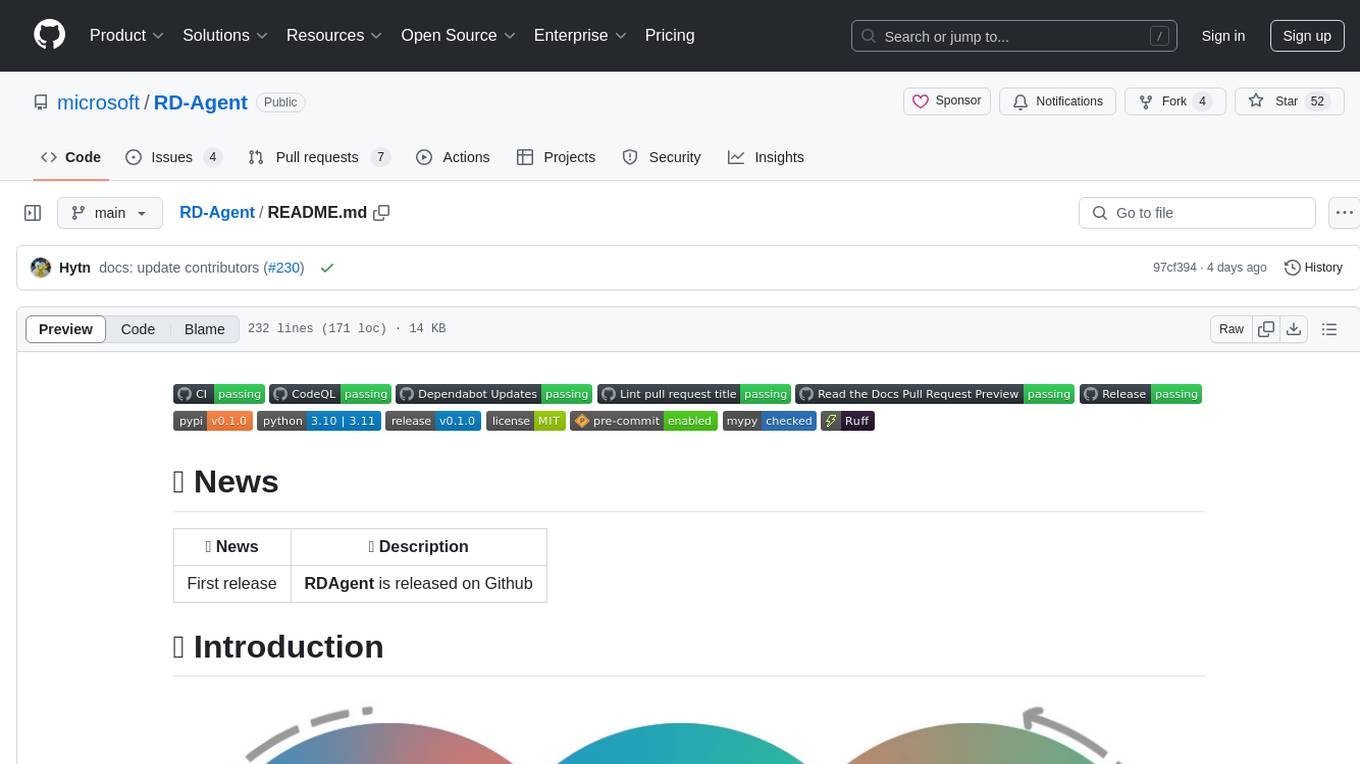
RD-Agent
RD-Agent is a tool designed to automate critical aspects of industrial R&D processes, focusing on data-driven scenarios to streamline model and data development. It aims to propose new ideas ('R') and implement them ('D') automatically, leading to solutions of significant industrial value. The tool supports scenarios like Automated Quantitative Trading, Data Mining Agent, Research Copilot, and more, with a framework to push the boundaries of research in data science. Users can create a Conda environment, install the RDAgent package from PyPI, configure GPT model, and run various applications for tasks like quantitative trading, model evolution, medical prediction, and more. The tool is intended to enhance R&D processes and boost productivity in industrial settings.
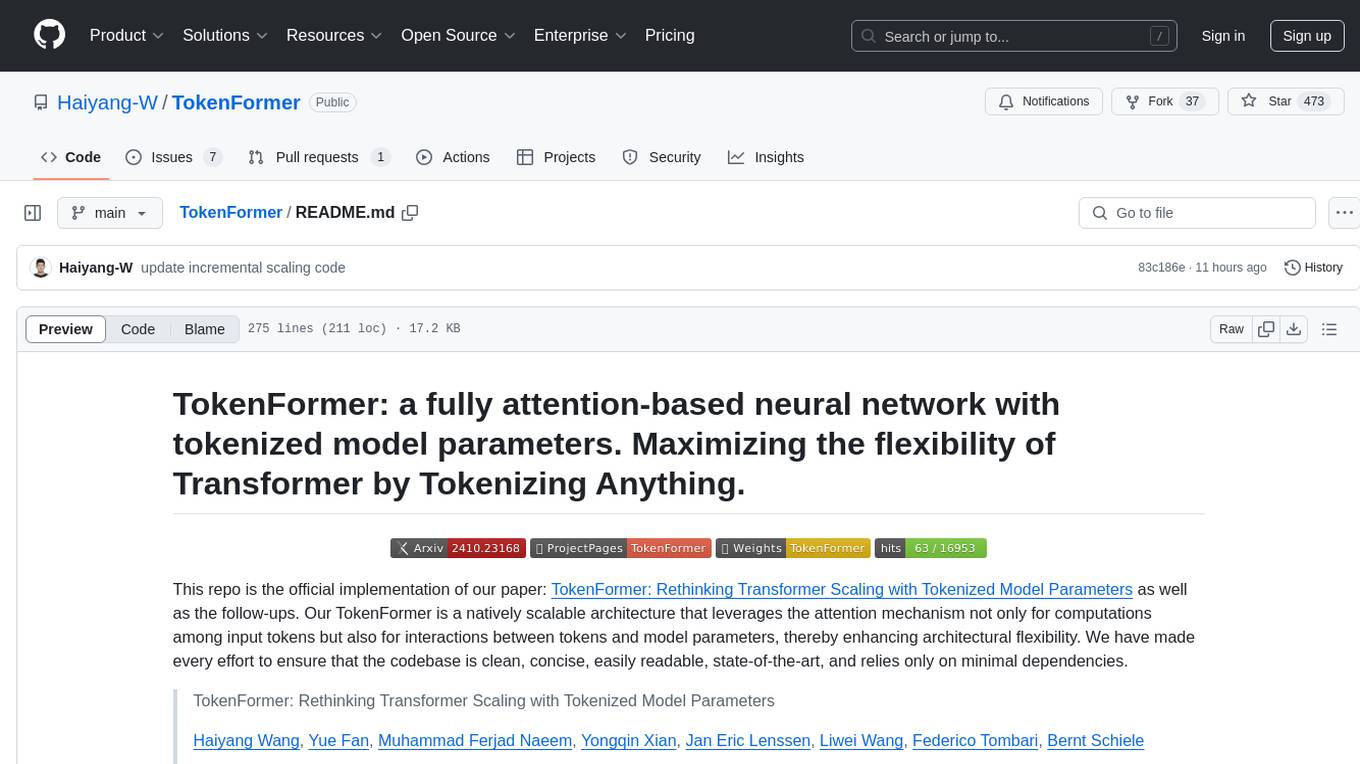
TokenFormer
TokenFormer is a fully attention-based neural network architecture that leverages tokenized model parameters to enhance architectural flexibility. It aims to maximize the flexibility of neural networks by unifying token-token and token-parameter interactions through the attention mechanism. The architecture allows for incremental model scaling and has shown promising results in language modeling and visual modeling tasks. The codebase is clean, concise, easily readable, state-of-the-art, and relies on minimal dependencies.
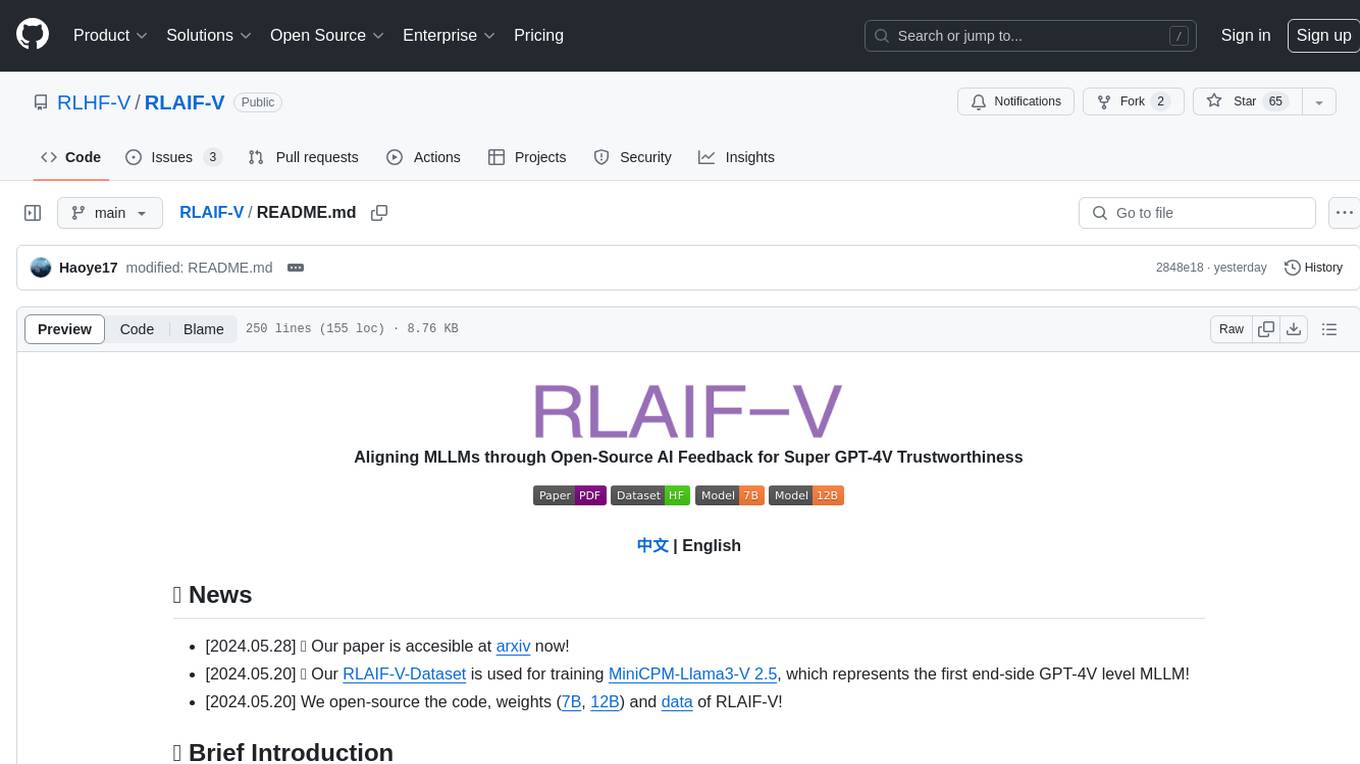
RLAIF-V
RLAIF-V is a novel framework that aligns MLLMs in a fully open-source paradigm for super GPT-4V trustworthiness. It maximally exploits open-source feedback from high-quality feedback data and online feedback learning algorithm. Notable features include achieving super GPT-4V trustworthiness in both generative and discriminative tasks, using high-quality generalizable feedback data to reduce hallucination of different MLLMs, and exhibiting better learning efficiency and higher performance through iterative alignment.

MetaGPT
MetaGPT is a multi-agent framework that enables GPT to work in a software company, collaborating to tackle more complex tasks. It assigns different roles to GPTs to form a collaborative entity for complex tasks. MetaGPT takes a one-line requirement as input and outputs user stories, competitive analysis, requirements, data structures, APIs, documents, etc. Internally, MetaGPT includes product managers, architects, project managers, and engineers. It provides the entire process of a software company along with carefully orchestrated SOPs. MetaGPT's core philosophy is "Code = SOP(Team)", materializing SOP and applying it to teams composed of LLMs.
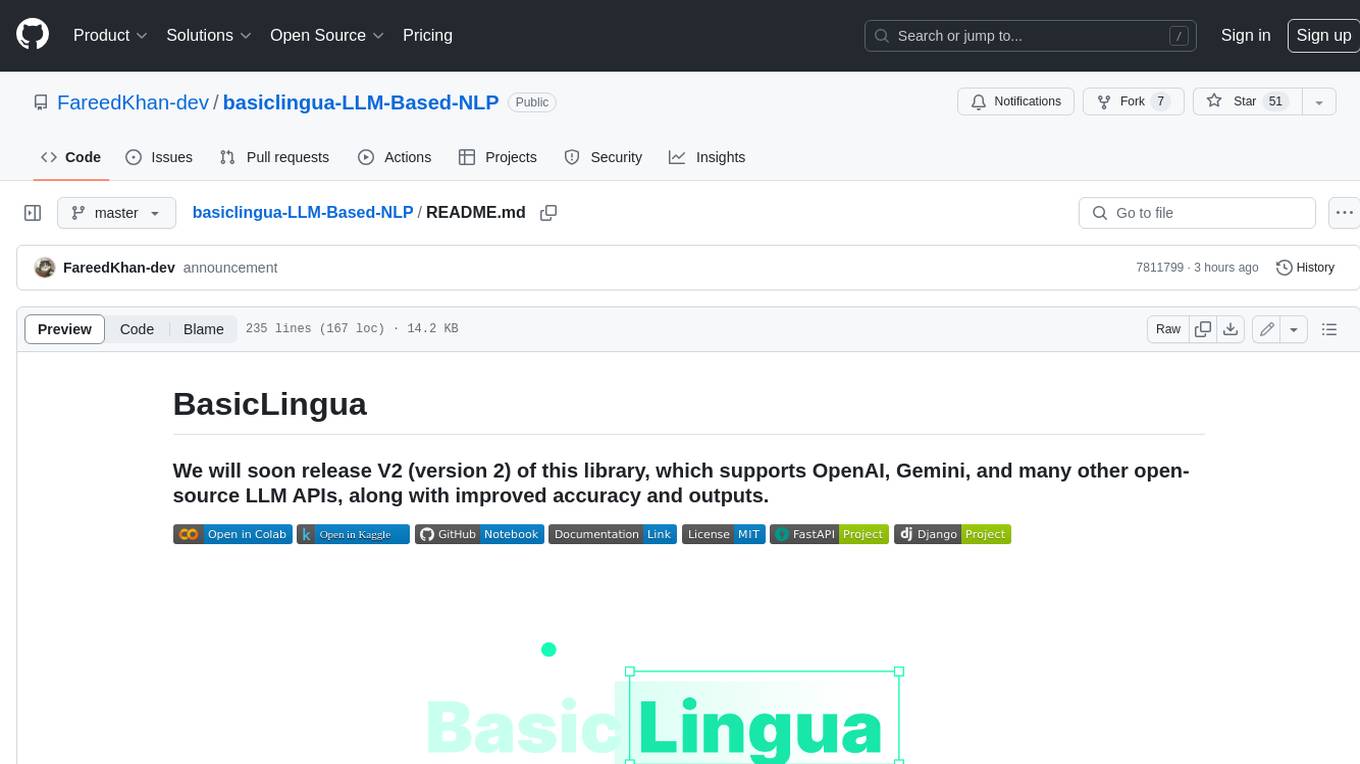
basiclingua-LLM-Based-NLP
BasicLingua is a Python library that provides functionalities for linguistic tasks such as tokenization, stemming, lemmatization, and many others. It is based on the Gemini Language Model, which has demonstrated promising results in dealing with text data. BasicLingua can be used as an API or through a web demo. It is available under the MIT license and can be used in various projects.
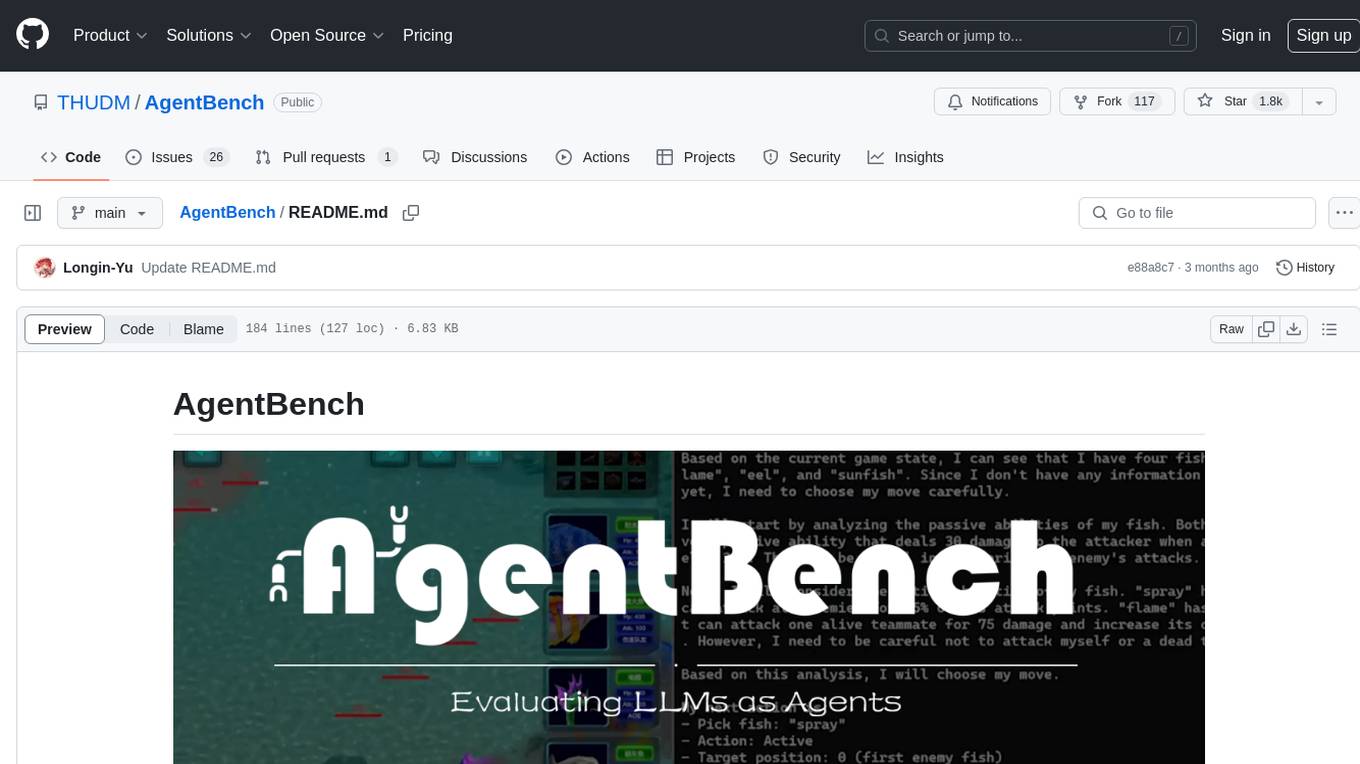
AgentBench
AgentBench is a benchmark designed to evaluate Large Language Models (LLMs) as autonomous agents in various environments. It includes 8 distinct environments such as Operating System, Database, Knowledge Graph, Digital Card Game, and Lateral Thinking Puzzles. The tool provides a comprehensive evaluation of LLMs' ability to operate as agents by offering Dev and Test sets for each environment. Users can quickly start using the tool by following the provided steps, configuring the agent, starting task servers, and assigning tasks. AgentBench aims to bridge the gap between LLMs' proficiency as agents and their practical usability.
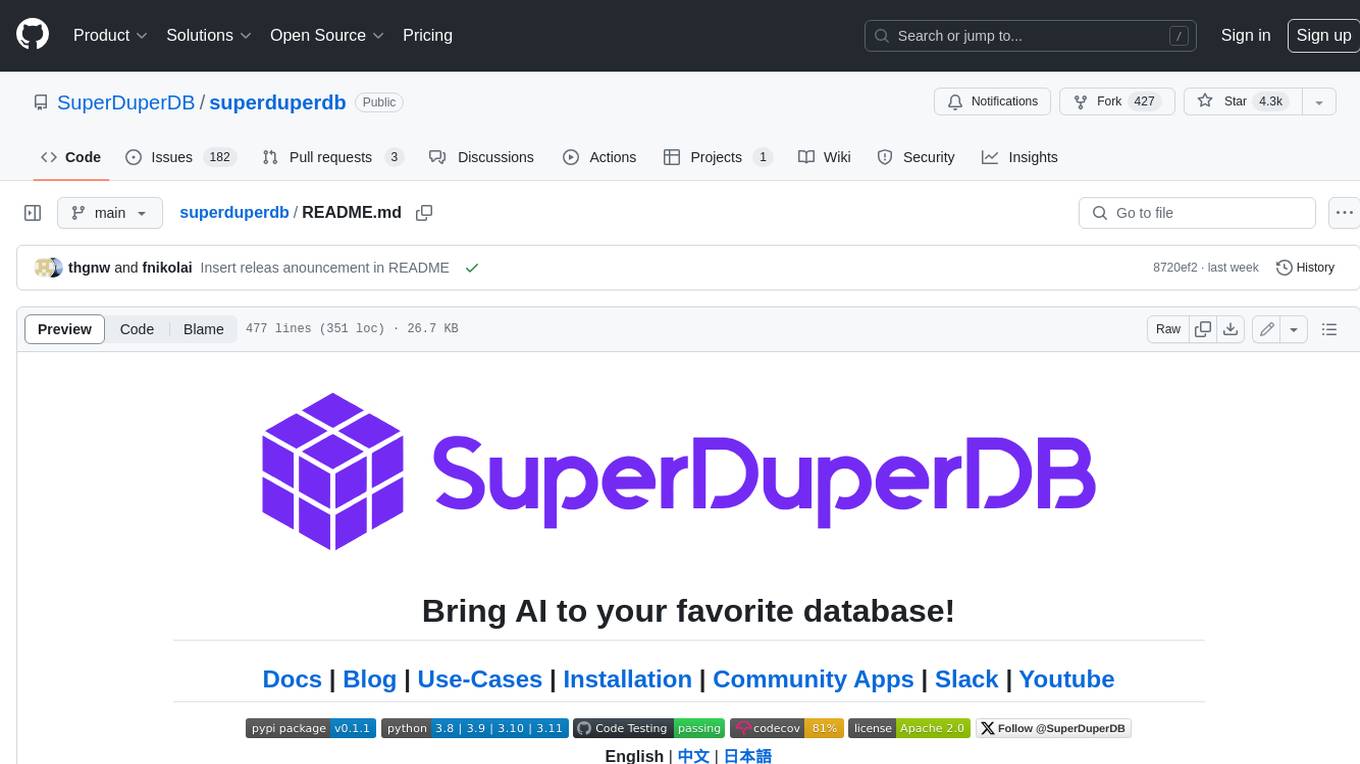
superduperdb
SuperDuperDB is a Python framework for integrating AI models, APIs, and vector search engines directly with your existing databases, including hosting of your own models, streaming inference and scalable model training/fine-tuning. Build, deploy and manage any AI application without the need for complex pipelines, infrastructure as well as specialized vector databases, and moving our data there, by integrating AI at your data's source: - Generative AI, LLMs, RAG, vector search - Standard machine learning use-cases (classification, segmentation, regression, forecasting recommendation etc.) - Custom AI use-cases involving specialized models - Even the most complex applications/workflows in which different models work together SuperDuperDB is **not** a database. Think `db = superduper(db)`: SuperDuperDB transforms your databases into an intelligent platform that allows you to leverage the full AI and Python ecosystem. A single development and deployment environment for all your AI applications in one place, fully scalable and easy to manage.
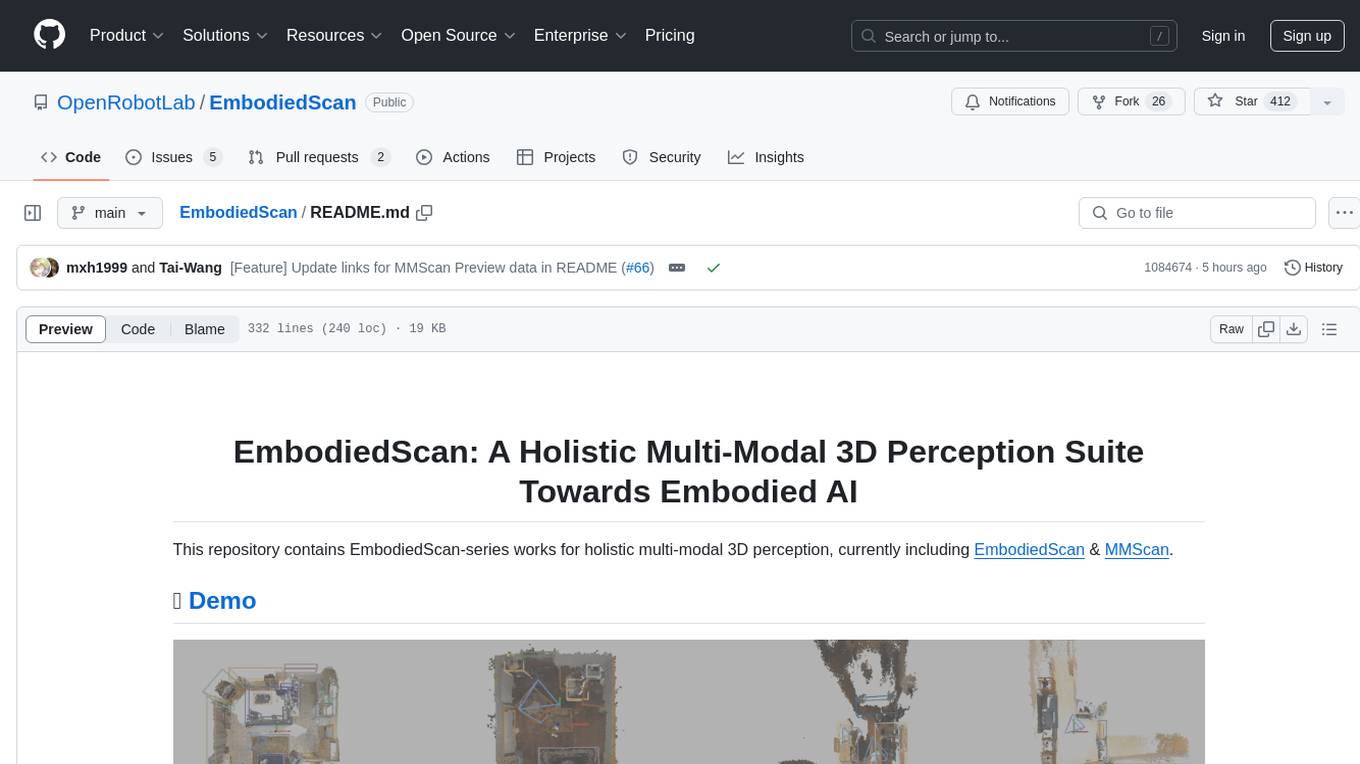
EmbodiedScan
EmbodiedScan is a holistic multi-modal 3D perception suite designed for embodied AI. It introduces a multi-modal, ego-centric 3D perception dataset and benchmark for holistic 3D scene understanding. The dataset includes over 5k scans with 1M ego-centric RGB-D views, 1M language prompts, 160k 3D-oriented boxes spanning 760 categories, and dense semantic occupancy with 80 common categories. The suite includes a baseline framework named Embodied Perceptron, capable of processing multi-modal inputs for 3D perception tasks and language-grounded tasks.
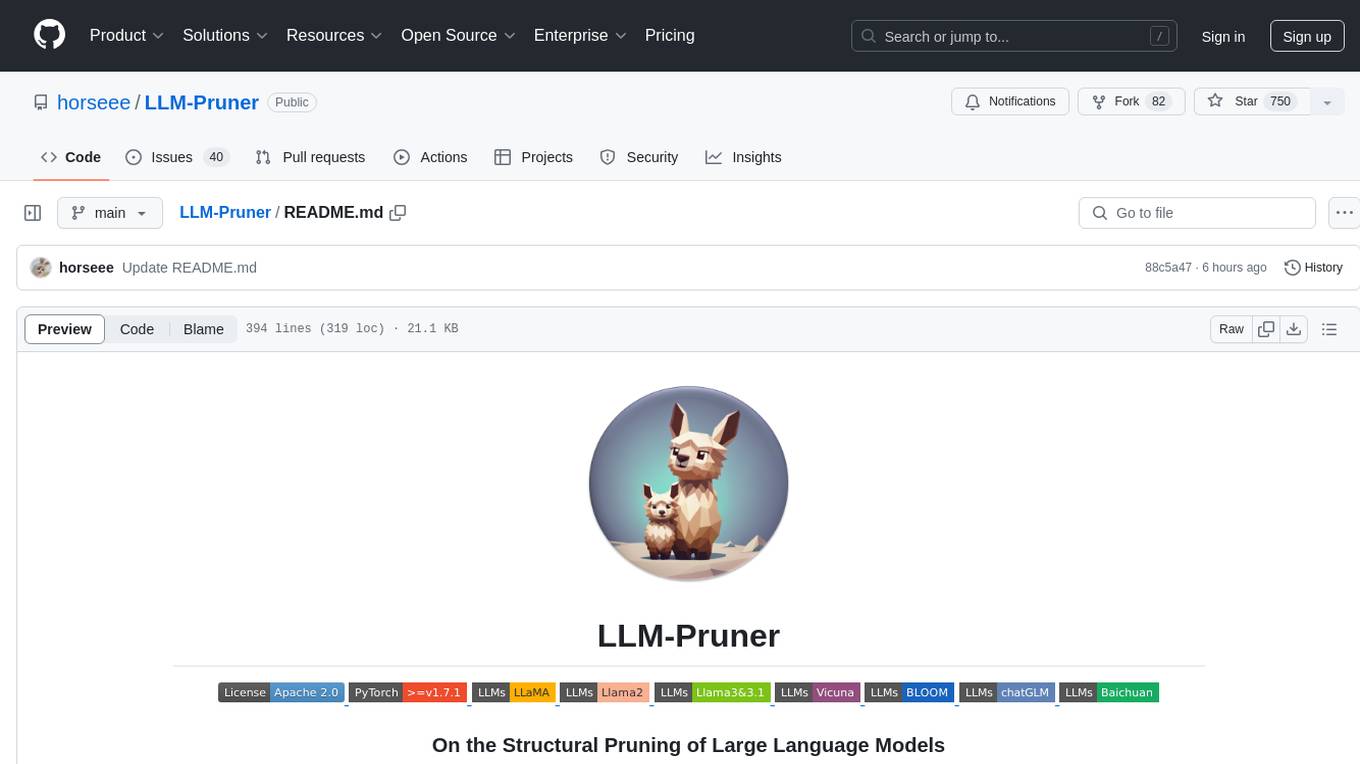
LLM-Pruner
LLM-Pruner is a tool for structural pruning of large language models, allowing task-agnostic compression while retaining multi-task solving ability. It supports automatic structural pruning of various LLMs with minimal human effort. The tool is efficient, requiring only 3 minutes for pruning and 3 hours for post-training. Supported LLMs include Llama-3.1, Llama-3, Llama-2, LLaMA, BLOOM, Vicuna, and Baichuan. Updates include support for new LLMs like GQA and BLOOM, as well as fine-tuning results achieving high accuracy. The tool provides step-by-step instructions for pruning, post-training, and evaluation, along with a Gradio interface for text generation. Limitations include issues with generating repetitive or nonsensical tokens in compressed models and manual operations for certain models.
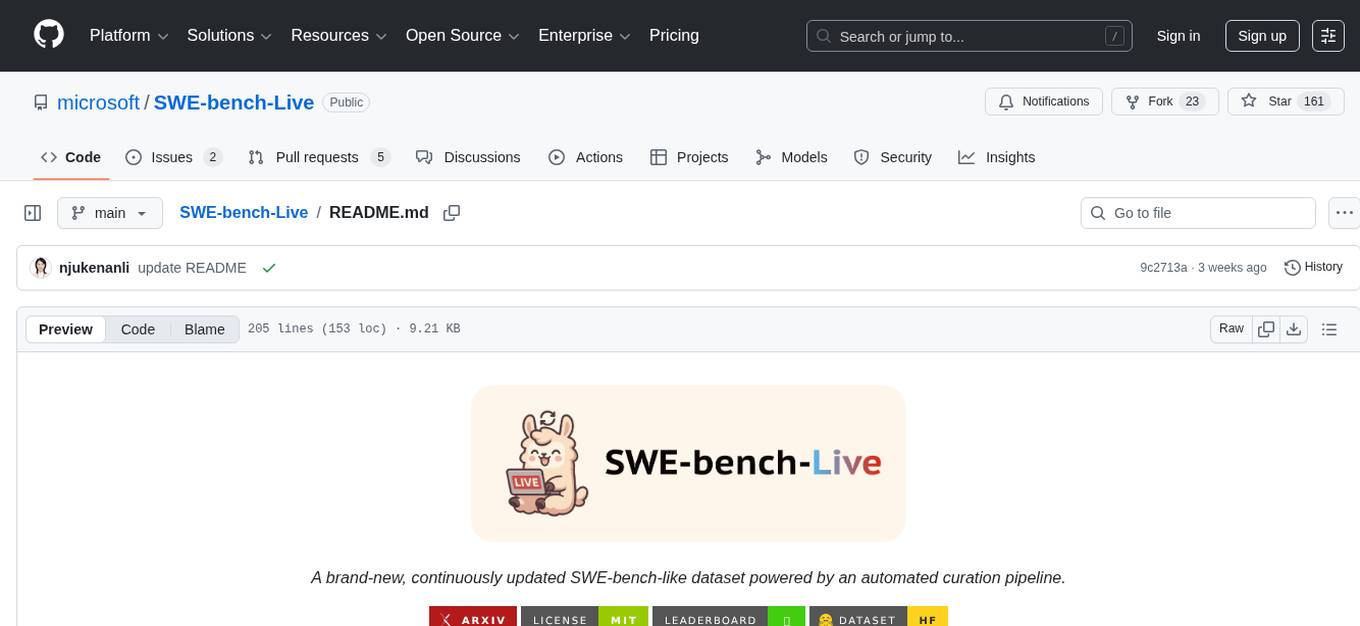
SWE-bench-Live
SWE-bench-Live is a live benchmark dataset for evaluating AI systems' ability to complete real-world software engineering tasks. It is continuously updated through an automated curation pipeline, providing the community with up-to-date task instances for rigorous and contamination-free evaluation. The dataset is designed to test the performance of various AI models on software engineering tasks and supports multiple programming languages and operating systems.
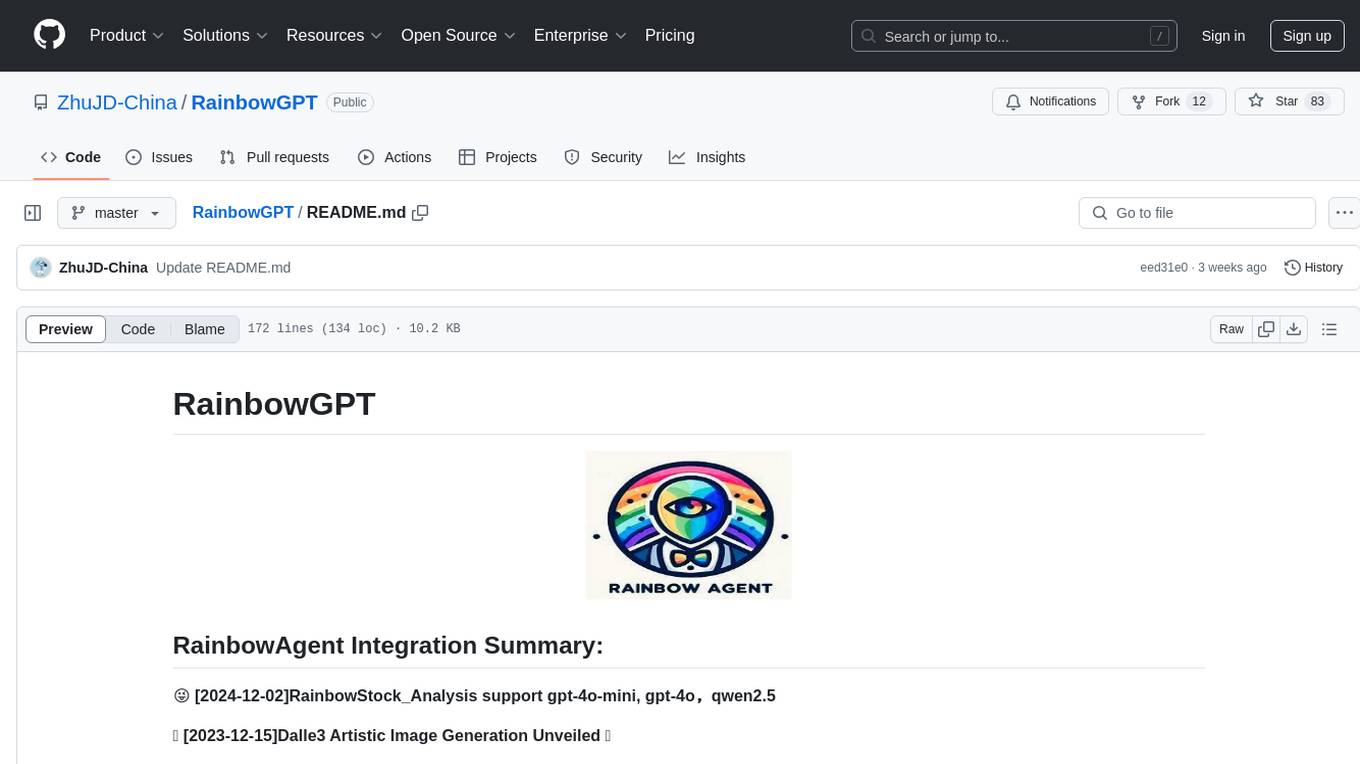
RainbowGPT
RainbowGPT is a versatile tool that offers a range of functionalities, including Stock Analysis for financial decision-making, MySQL Management for database navigation, and integration of AI technologies like GPT-4 and ChatGlm3. It provides a user-friendly interface suitable for all skill levels, ensuring seamless information flow and continuous expansion of emerging technologies. The tool enhances adaptability, creativity, and insight, making it a valuable asset for various projects and tasks.
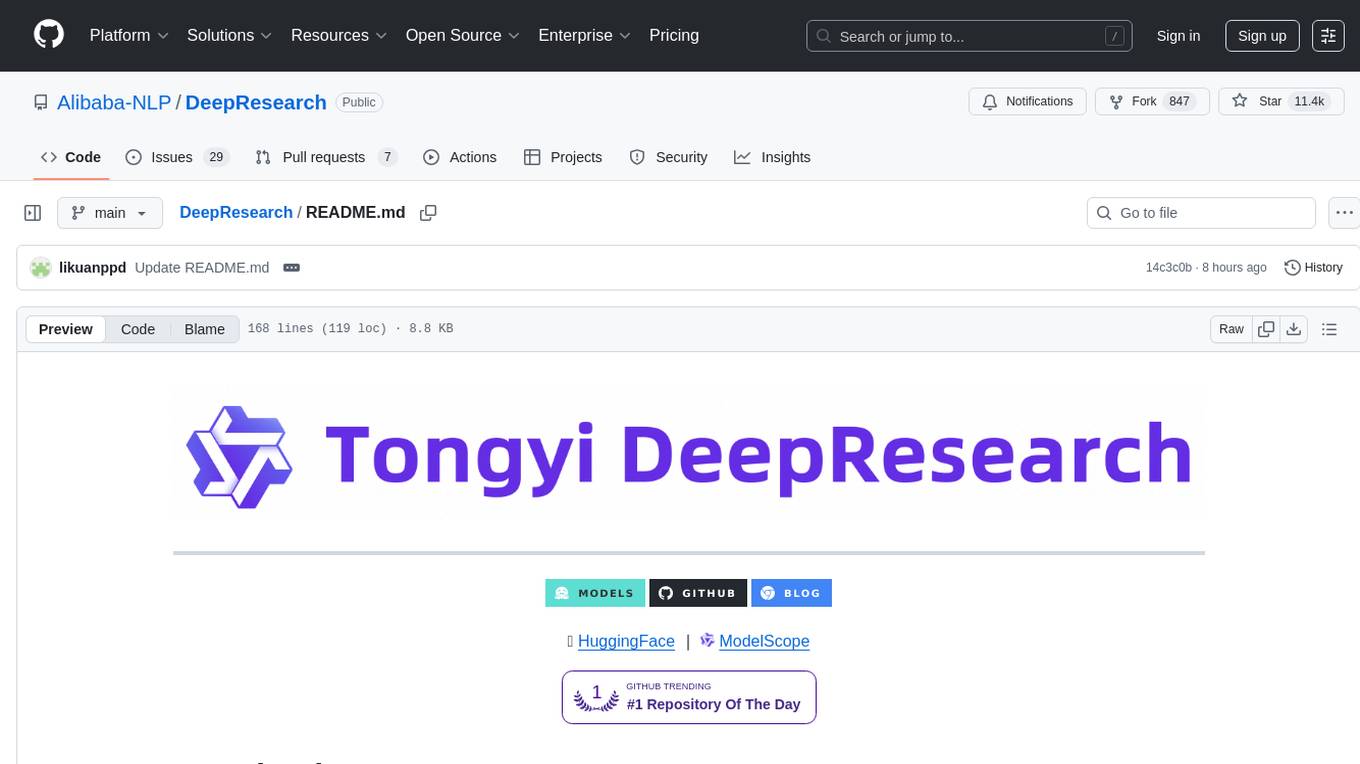
DeepResearch
Tongyi DeepResearch is an agentic large language model with 30.5 billion total parameters, designed for long-horizon, deep information-seeking tasks. It demonstrates state-of-the-art performance across various search benchmarks. The model features a fully automated synthetic data generation pipeline, large-scale continual pre-training on agentic data, end-to-end reinforcement learning, and compatibility with two inference paradigms. Users can download the model directly from HuggingFace or ModelScope. The repository also provides benchmark evaluation scripts and information on the Deep Research Agent Family.
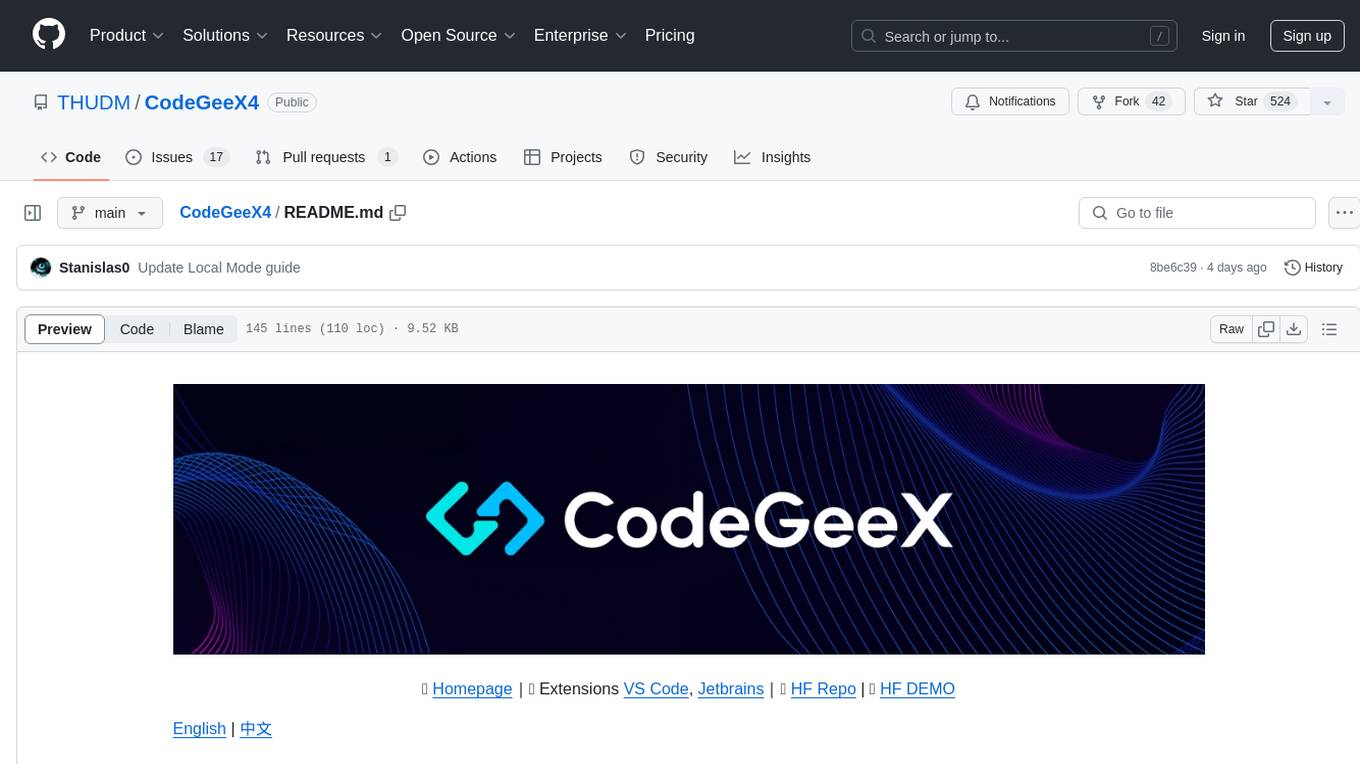
CodeGeeX4
CodeGeeX4-ALL-9B is an open-source multilingual code generation model based on GLM-4-9B, offering enhanced code generation capabilities. It supports functions like code completion, code interpreter, web search, function call, and repository-level code Q&A. The model has competitive performance on benchmarks like BigCodeBench and NaturalCodeBench, outperforming larger models in terms of speed and performance.
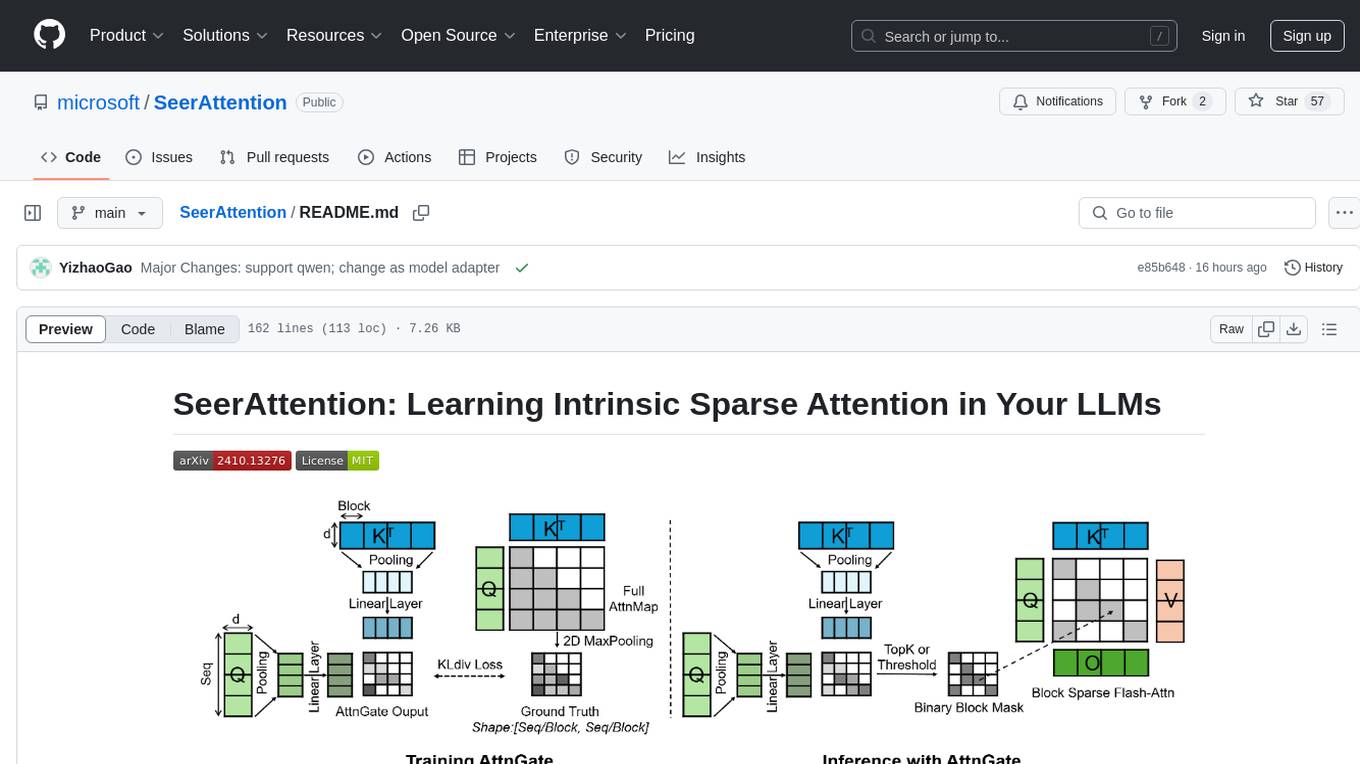
SeerAttention
SeerAttention is a novel trainable sparse attention mechanism that learns intrinsic sparsity patterns directly from LLMs through self-distillation at post-training time. It achieves faster inference while maintaining accuracy for long-context prefilling. The tool offers features such as trainable sparse attention, block-level sparsity, self-distillation, efficient kernel, and easy integration with existing transformer architectures. Users can quickly start using SeerAttention for inference with AttnGate Adapter and training attention gates with self-distillation. The tool provides efficient evaluation methods and encourages contributions from the community.
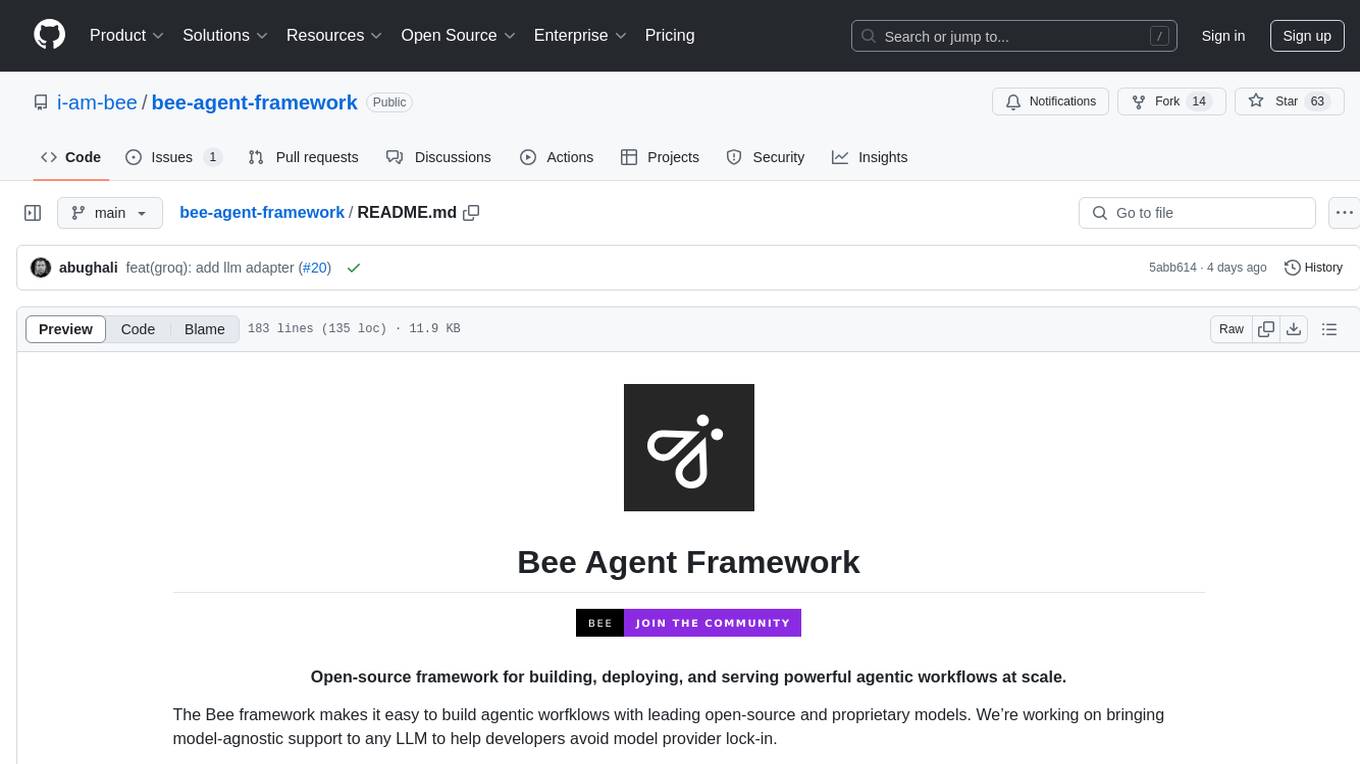
bee-agent-framework
The Bee Agent Framework is an open-source tool for building, deploying, and serving powerful agentic workflows at scale. It provides AI agents, tools for creating workflows in Javascript/Python, a code interpreter, memory optimization strategies, serialization for pausing/resuming workflows, traceability features, production-level control, and upcoming features like model-agnostic support and a chat UI. The framework offers various modules for agents, llms, memory, tools, caching, errors, adapters, logging, serialization, and more, with a roadmap including MLFlow integration, JSON support, structured outputs, chat client, base agent improvements, guardrails, and evaluation.
For similar tasks

evalverse
Evalverse is an open-source project designed to support Large Language Model (LLM) evaluation needs. It provides a standardized and user-friendly solution for processing and managing LLM evaluations, catering to AI research engineers and scientists. Evalverse supports various evaluation methods, insightful reports, and no-code evaluation processes. Users can access unified evaluation with submodules, request evaluations without code via Slack bot, and obtain comprehensive reports with scores, rankings, and visuals. The tool allows for easy comparison of scores across different models and swift addition of new evaluation tools.
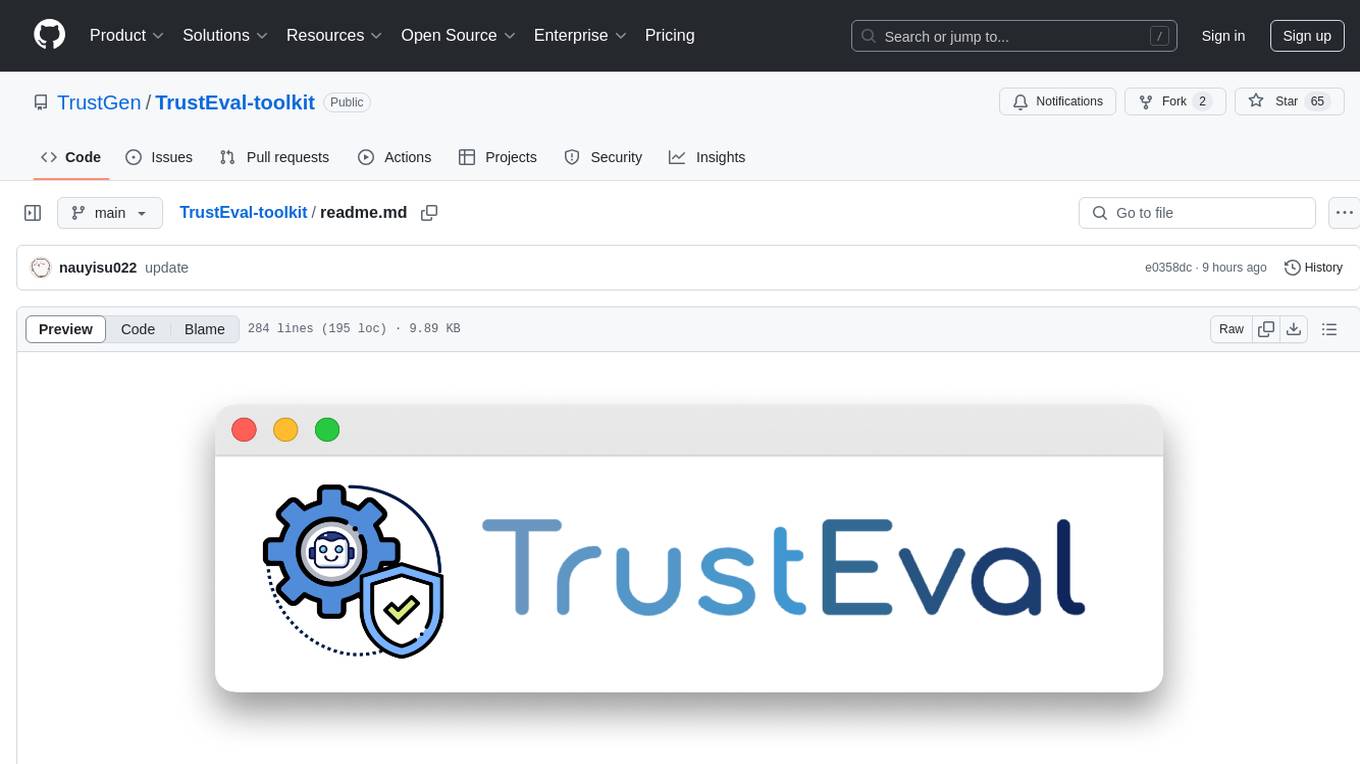
TrustEval-toolkit
TrustEval-toolkit is a dynamic and comprehensive framework for evaluating the trustworthiness of Generative Foundation Models (GenFMs) across dimensions such as safety, fairness, robustness, privacy, and more. It offers features like dynamic dataset generation, multi-model compatibility, customizable metrics, metadata-driven pipelines, comprehensive evaluation dimensions, optimized inference, and detailed reports.
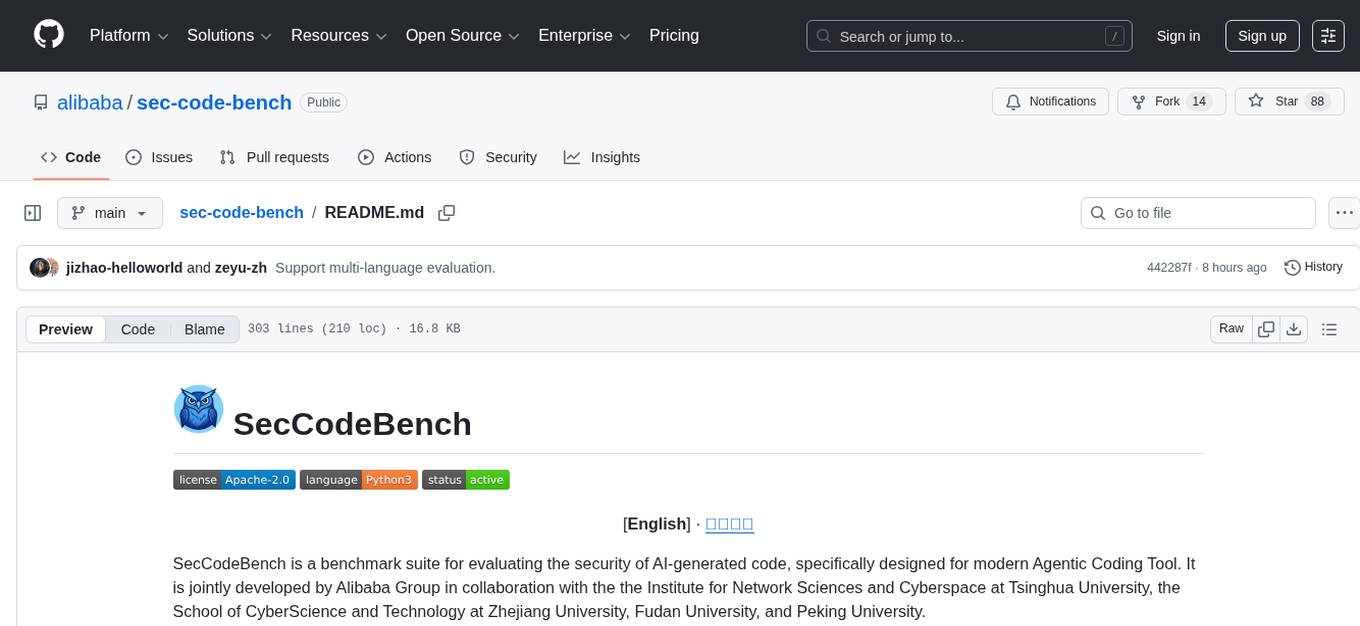
sec-code-bench
SecCodeBench is a benchmark suite for evaluating the security of AI-generated code, specifically designed for modern Agentic Coding Tools. It addresses challenges in existing security benchmarks by ensuring test case quality, employing precise evaluation methods, and covering Agentic Coding Tools. The suite includes 98 test cases across 5 programming languages, focusing on functionality-first evaluation and dynamic execution-based validation. It offers a highly extensible testing framework for end-to-end automated evaluation of agentic coding tools, generating comprehensive reports and logs for analysis and improvement.
For similar jobs

evalverse
Evalverse is an open-source project designed to support Large Language Model (LLM) evaluation needs. It provides a standardized and user-friendly solution for processing and managing LLM evaluations, catering to AI research engineers and scientists. Evalverse supports various evaluation methods, insightful reports, and no-code evaluation processes. Users can access unified evaluation with submodules, request evaluations without code via Slack bot, and obtain comprehensive reports with scores, rankings, and visuals. The tool allows for easy comparison of scores across different models and swift addition of new evaluation tools.
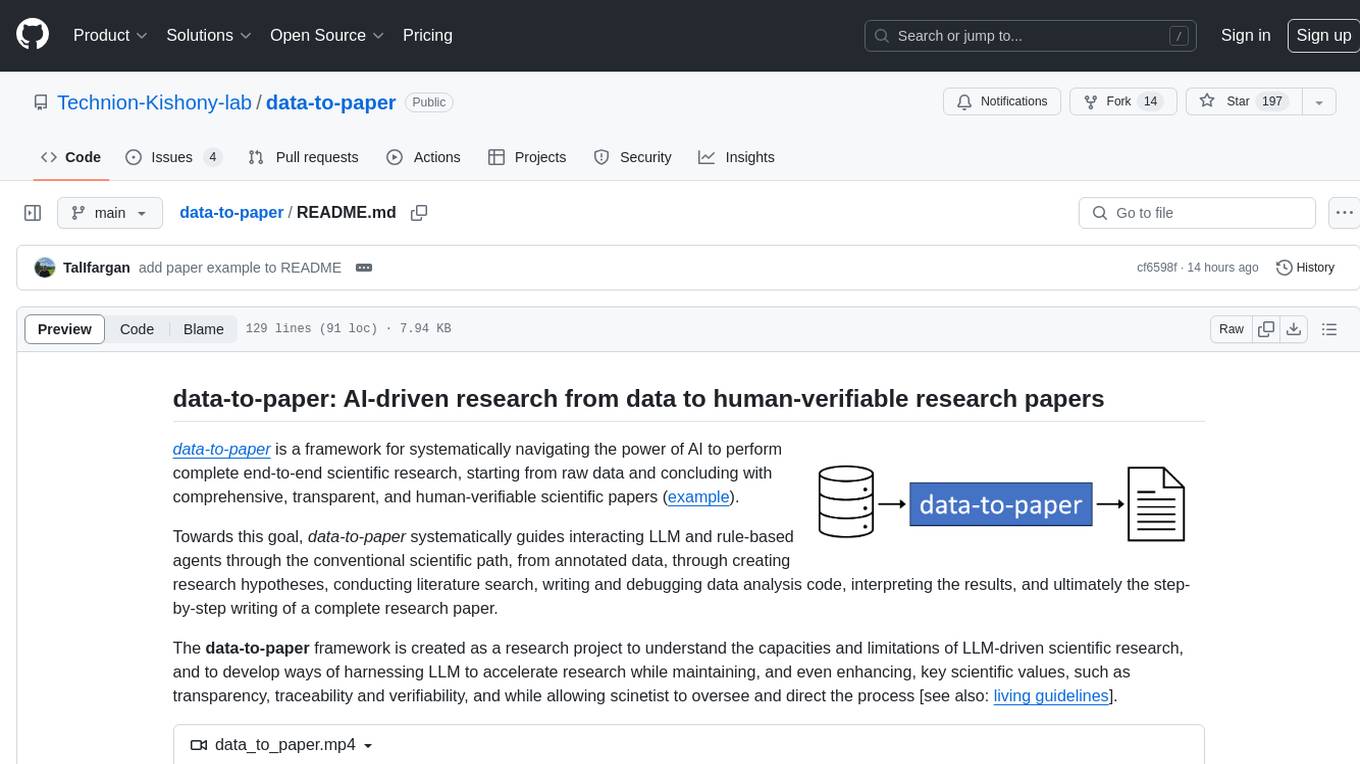
data-to-paper
Data-to-paper is an AI-driven framework designed to guide users through the process of conducting end-to-end scientific research, starting from raw data to the creation of comprehensive and human-verifiable research papers. The framework leverages a combination of LLM and rule-based agents to assist in tasks such as hypothesis generation, literature search, data analysis, result interpretation, and paper writing. It aims to accelerate research while maintaining key scientific values like transparency, traceability, and verifiability. The framework is field-agnostic, supports both open-goal and fixed-goal research, creates data-chained manuscripts, involves human-in-the-loop interaction, and allows for transparent replay of the research process.

weave
Weave is a toolkit for developing Generative AI applications, built by Weights & Biases. With Weave, you can log and debug language model inputs, outputs, and traces; build rigorous, apples-to-apples evaluations for language model use cases; and organize all the information generated across the LLM workflow, from experimentation to evaluations to production. Weave aims to bring rigor, best-practices, and composability to the inherently experimental process of developing Generative AI software, without introducing cognitive overhead.

agentcloud
AgentCloud is an open-source platform that enables companies to build and deploy private LLM chat apps, empowering teams to securely interact with their data. It comprises three main components: Agent Backend, Webapp, and Vector Proxy. To run this project locally, clone the repository, install Docker, and start the services. The project is licensed under the GNU Affero General Public License, version 3 only. Contributions and feedback are welcome from the community.

oss-fuzz-gen
This framework generates fuzz targets for real-world `C`/`C++` projects with various Large Language Models (LLM) and benchmarks them via the `OSS-Fuzz` platform. It manages to successfully leverage LLMs to generate valid fuzz targets (which generate non-zero coverage increase) for 160 C/C++ projects. The maximum line coverage increase is 29% from the existing human-written targets.

LLMStack
LLMStack is a no-code platform for building generative AI agents, workflows, and chatbots. It allows users to connect their own data, internal tools, and GPT-powered models without any coding experience. LLMStack can be deployed to the cloud or on-premise and can be accessed via HTTP API or triggered from Slack or Discord.

VisionCraft
The VisionCraft API is a free API for using over 100 different AI models. From images to sound.

kaito
Kaito is an operator that automates the AI/ML inference model deployment in a Kubernetes cluster. It manages large model files using container images, avoids tuning deployment parameters to fit GPU hardware by providing preset configurations, auto-provisions GPU nodes based on model requirements, and hosts large model images in the public Microsoft Container Registry (MCR) if the license allows. Using Kaito, the workflow of onboarding large AI inference models in Kubernetes is largely simplified.


